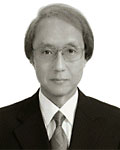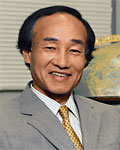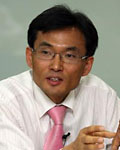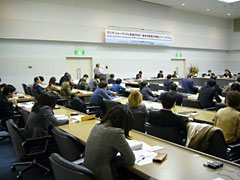Asian Journalists Symposium 2009
"Development of Fundamental Values and Journalism - Past, Present and Future, Achievements and Prospects of the Media"
(Summary)
April 1, 2009
The Ministry of Foreign Affairs held the Asian Journalists Symposium 2009 on March 18 at the United Nations University under the theme of "Development of Fundamental Values and Journalism - Past, Present and Future, Achievements and Prospects of the Media." Lively discussions were held in three sessions: "Democratization and Journalism," "Economic Development and Journalism" and "Media's Digitization and Journalism." The summary of the Symposium is as follows:
1. Outline of the Symposium
(1) Date and Time:
13:30-17:30, Wednesday, March 18, 2009
(2) Venue:
United Nations University (Elizabeth Rose Conference Hall)
(3) Format:
Open Symposium (About 100 audience)
(4) Chair and Panelists (Six persons):
- Chair: Mr. Toshiyuki Sato, Special Controller, General Broadcasting Administration, Japan Broadcasting Corporation (NHK)
- Keynote Speaker: Dr. Isami Takeda, Professor, Faculty of Foreign Studies, Dokkyo University
- Japanese panelist: Mr. Akira Fujino, Senior Editor, The Yomiuri Shimbun
- Indonesian panelist: Ms. Myrna Ratna Maulidiana, Editor of Political Desk, Kompas Daily
- R.O.K. panelist: Mr. Yeon Ho Oh, CEO and Founder, Ohmynews Co., Ltd.
- Indian panelist: Mr. Unni Rajen Shanker, Executive Editor, The Indian Express
2. Summary of the Symposium
(1) Keynote Speech by Dr. Isami Takeda, Professor, Faculty of Foreign Studies, Dokkyo University

Dr. Takeda first pointed out that we are now in an age when the media have come into the hands of citizens. He cited the example of a book review (actually of a monthly magazine) by an ultra-local on-line community paper that was carried on the local news page of "Yahoo Japan" and the book has become a million seller. He, however, also draw the attention of the audience to another aspect that the new media can be used by any writer so that where responsibility lies is vague and the quality is seldom if ever guaranteed.
Dr. Takeda then referred to the relationship between the media and the economy, taking two economic crises in the past 15 years: the Asian economic crisis that started in Bangkok, Thailand, in July 1997 and the Lehman Brothers Shock in September 2008. He said that because of the first crisis, the U.S. media companies, in terms of results, expelled their Asian competitors from the market by taking advantage of the principle of capitalism. He also stated that the Lehman Shock has deprived the media of much of their ad-revenues and circulation, prompting the realignment of the U.S. media, and forcing even such first-rate papers as the Boston Globe and the Chicago Tribune to consider going online. Referring to the situation in Japan, Dr. Takeda pointed out that the print media, especially monthly and weekly magazines, have long been in a difficult situation. At the same time, Dr. Takeda offered bright topics: media net-working, an attempt by some Asian media companies to protect themselves, has been an important movement for the past ten years, and in China or India or Indonesia, the circulation of the print media has been growing.
Dr. Takeda also touched upon the issues of the print media. He said it is important that the media should have diversity, because monitoring the government is one of the important roles of the media. Referring to the alternatives that the print media can seek, Dr. Takeda mentioned three courses; (1) narrow down the reader target, (2) survive as free papers, or (3) go online.
Finally Dr. Takeda concluded his speech by leaving a couple of questions: If the print media weakens, who can play the role of the balancer of the media? The development of citizen-participating journalism is welcome but how can its contents be secured?
(2) The First Session : Democratization and Journalism

At the outset, Mr. Sato expressed his hope that the Symposium would be an opportunity for participants to review the past roles and challenges of Asian media and also to consider their future roles and challenges. He then asked what part the media had played in a major event in the post-war democratization process in each country. Each panelist responded as follows:
(a) Ms. Myrna Ratna Maulidiana

The year of 1998 marked the new era of democratization in Indonesia. The downfall of the Suharto regime brought the deregulation of the press and a sharp increase in the number of domestic print media from 200 to 1600 in a year. Yet the recession following the Asian Currency Crisis and the fierce competition among those media resulted in the media industry shrinking again. Moreover, due to the current global economic crisis triggered by the corruption of Lehman Brothers in 2008, Indonesia now needs the government's strong leadership, which might have a large impact on the democratization process in the country. Therefore, Indonesian media should make efforts to retain the checks and balances between themselves and the government and to ensure human rights and the rule of law so that the democratization process will not be set back.
(b) Mr. Yeon Ho Oh

With the military seizing power, many Korean people could not enjoy freedom of speech before 1992, and it was the darkest period for the Korean media. After 1992, however, Korean journalism experienced two types of democratization. One was the democratization of the society, which meant that a democracy movement brought a civilian government and secured freedom of speech. It was young citizens and journalists that led the movement at that time, and the mainstream media just followed them. The other was the democratization of the media market, which was promoted by the introduction of online media. Specifically, the Korea National Press Club was democratized, allowing journalists of small online-news media to attend events like presidential news conferences.
(c) Mr. Unni Rajen Shanker

Except in 1975 when martial law was declared, India has basically retained the freedom of the press, and the democratization of the media has been promoted especially in the past ten years. The country used to have only a public broadcaster, but it now has 215 TV channels broadcasting news around the clock, which enables anyone to report news as long as they have a video camera. There are concerns about the excessive freedom of press, but it is also true that even such news as is likely to be overlooked has been reported in India. In addition, the Information Disclosure Law enacted in 2005 promoted the democratization of the media, requiring the government to provide any information upon request from the public.
(d) Mr. Akira Fujino

"Democratization" or "journalism" should not be regarded as a single concept, and there are various types of democracy as well. For example, journalism in Japan and that in China are different. Securing the "freedom of the press" is crucial for Japanese journalism, which has developed in the post-war era, influenced by American journalism. Meanwhile, Chinese journalism does not deny "freedom of the press," but its first priority is "protecting the national interest." Of importance is, however, that we understand different types of journalism without criticizing each other. It seems that we can at least share the view that "journalism exists for the people."
(3) Second Session: Economic Development and Journalism
At the outset, Mr. Sato said that he wanted to start this session from discussing how each country's media have reported and looked at the present crisis called a "global simultaneous economic recession once in a century all over the world" or "burst of the super bubble." Mr. Sato also posed a question to each panelist asking if they would attempt to solve environmental issues in such an economic crisis. The remarks of each panelist on these questions are as follows:
(a) Mr. Akira Fujino
The economic crisis has an impact on newspaper companies in two aspects; reporting and management. The newspapers are supposed to report daily on the financial and monetary policies of the government, but at the same time, editors are now beginning to think strongly that the newspapers should offer much more economic information that is directly useful for the general public. From the management aspect, the decrease of advertising revenues has become apparent and has started to have a direct impact on the way of the editing as well. The financial crisis is a news object, but at the same time, we have been caught in the crisis as an organization. This is the current crisis situation in Japan. For the future development, we are having difficulty in finding new prospects and bright hopes.
In terms of China's economy, social harmony and environmental conservation were sought after before, but the Chinese government has to achieve the 8% economic growth that is a paramount national policy. This is not necessary a policy transformation. The Chinese government, however, has a basic stance that it is not able to have any other objectives without economic development.
(b) Mr. Unni Rajen Shanker
The impact of the current economic crisis, in India, has included announcement of salary cuts by an English language newspaper and increasing suicide of unemployed persons. Therefore, articles about the economic crisis used to be on later pages, but now we are carrying them on the front page.
There is a move to report on environmental issues in a more conspicuous part of the newspapers recently; however, India is a developing country and we have different viewpoints about the climate change issues. We are other side of the debate. Articles on the climate issues are beginning to be more noticeable, and I think it is necessary to devote more space to them, but we are still at a trial-and-error stage.
(c) Mr. Yeon Ho Oh
In the ROK, it was only among academics and some progressive intellectuals at first, but, now ordinary citizens have come to have much doubt about the American economic development system since the economic crisis has occurred. The recession of the economy may accelerate the polarization between the "haves" and "have-nots" and worsen social security. The influence of advertisers is getting bigger in the media market. When the media are in a financially difficult situation, dependence on advertisers and advertising revenues may become higher and there is a fear that the articles are compromised. It is desirable to find an income source other than advertisements, but it is not easy. Like the conventional media, almost all of the online media are financed by advertising revenues (Ohmynews is 75%). Therefore, both the conventional media and the new media are affected by the economic crisis.
On environmental issues, compared with five or ten years ago, the climate change issue is taken up daily by newspapers and is becoming a central agenda though it is not a priority issue. It is becoming a familiar topic to the people, and civilian concern is high.
(d) Ms. Myrna Ratna Maulidiana
Talking about the financial crisis, in the "first crisis," a riot aiming at Chinese people occurred in Jakarta in 1998. In the "second crisis," to avoid such a thing, we interviewed experts on the economy about the facts and causes of the recent crisis. Our reports have been careful and comprehensive. Our approach to the crisis has been one which makes people feel relieved.
Articles on climate change are very important for newspapers because Indonesia has been affected by such disasters as tsunami and seasonal flooding. There is a special section for environmental issues, but it is difficult to change the mentality of citizens, particularly that of poor local people, because Indonesia is a developing country like India.
(4) The Third Session : Media's Digitization and Journalism
At the outset, Mr. Sato introduced a pessimistic question: "While the existing media, with many of them suffering bleak business conditions, have been challenged by various new media, it has been getting difficult to issue newspapers in such big cities as LA and Chicago. In such miserable conditions how can the existing media play the role of a watchdog?" He then entertained the panelists' opinions. The following is the lively discussion held in this session about the existing and the new media:
(a) Mr. Yeon Ho Oh
With the advent of the IT society, new space was created inviting many new players. The Internet has changed the basic concept of journalism: who are journalists and what is news, beyond the limit of time and space. Even in 2002, before Mr. Obama was elected as U.S. President, in the R.O.K., President Moo Hyun Roh was elected partly because of the support by young people on the Internet. This Internet influence, however, did not take place all of a sudden. It had long been fermenting underneath the surface against the backdrop of the change and continuity of the market. On the other hand, such values as credibility and accountability of journalism have been continued. In that sense, Ohmynews checks all the articles written by citizen reporters to confirm facts, so it differs from blogs.
When I attended the same kind of conference, I said that newspapers would not go but paper might not be used. The Internet is a new medium, but the print media are still leading in dealing with major national topics not only in Japan and India but in the ROK. This is where the print media has strength. When it comes to interaction with readers, however, the Internet newspapers have higher potentiality. What the Internet media lack may be the ability to raise issues.
One more thing I want to say to those of the traditional media is that your competitors are not Ohmynews or the Internet media or the Internet newspapers. Your competitors are Internet space itself, or the citizens themselves who are participating in Internet space. If we take that position, the traditional media are losing its power compared to Internet space. Lets us neither compare the traditional media with only one on-line newspaper nor compare only with major players, but let us look at the whole of news space.
(b) Ms. Myrna Ratna Maulidiana
In Indonesia, as 11 million people are illiterate and as Internet access was limited to 25 million people (only 12% of the total population) until last year, the online media is not really threatening. Still, there is a certain trend. Considered that our company's website receives 61 million accesses and 199 million page views per month, a similar trend as in the U.S.A. and European countries will be apparent in Indonesia in the future.
Although print media might decline, the spirit of journalism must not be lost. Print media cannot rival online media in terms of the quantity of information which it affords. Still, the traditional media are better in terms of credibility and the ability to raise issues.
(c) Mr. Unni Rajen Shanker
In India the situation for the traditional media is not really critical, because the broadband service is not wide-spread. In fact, the penetration rate of the Internet is just 7% among the country's population that exceeds 1 billion. However, the people are mostly beginning to recognize the significance of the digital media, and printed versions and digital versions are being integrated throughout almost all the mass media. There is no digital-only media in India. But, apart from this, what is important is credibility. Also, well-trained journalists are necessary for democratic society.
(d) Mr. Akira Fujino
Japanese newspapers have the world's top-class penetration rate. They are skyrocketing in their home-delivery rate through agents, which reaches about 94%. It is hard to assume that the know-how of newspaper management, which has been built up for more than one hundred years, will collapse to any great extent in the near future.
I also basically agree with the view that the spirit of journalism will not change in the future. Newspapers have their own journalism, which has been cultivated in terms of professionalism, continuity of reporting, and press ethics for a long time. It is hard to expect that this journalism will be surpassed in the particular aspects mentioned above by the online journalism with a history of no longer than 2 decades. The traditional media should compete on quality. As they can provide analyses, background and viewpoints, the print media and newspapers will be able to keep their competitive edge, if they continue their own efforts. Newspaper and broadcast journalists have long careers, and work with the techniques and identity of professionals. It is doubtful if we can expect citizen journalists to have professionalism.
(5) Chair's Summary
The Symposium was closed with a summary by Mr. Sato as follows:
"Today, we discussed the role which media has played in the promotion of democracy, and how the existing media will change, in consideration of the challenge of the new media to the traditional ones. It is a good thing that it has become possible for everyone to send messages via blogs and the like, but what can professional journalists do under these conditions? What professional journalists should do is to look for what they should report as well as to respond to various criticisms. In today's discussion, we discussed what will change, what will not change, and what should not be changed. I express my gratitude to the panelists for today's wide-ranging discussion. I will highly value meetings like we have had today."

Back to Index
